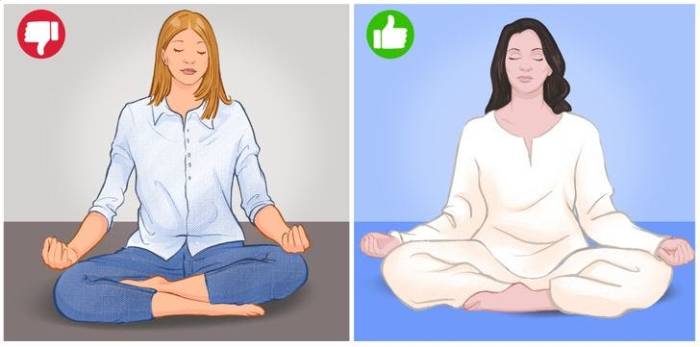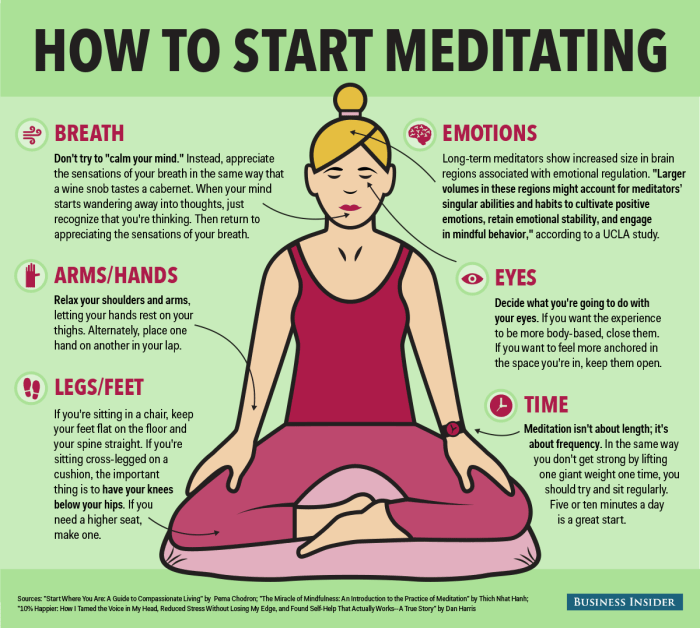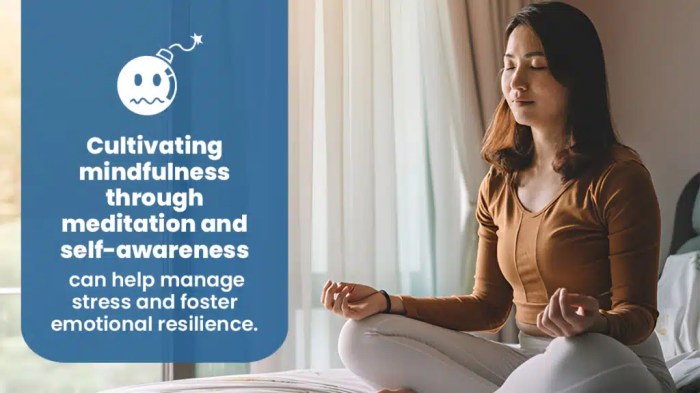How to Meditate for Enhancing Your Emotional Health introduces the powerful practice of meditation for improving emotional well-being, offering insights on various techniques, steps to start meditating, and tips for overcoming challenges.
Introduction to Meditation for Emotional Health
Meditation is a practice that involves focusing the mind and eliminating distractions to achieve a state of mental clarity and emotional calmness. It has been used for centuries to promote overall well-being, reduce stress, and enhance emotional health.
Benefits of Meditation for Emotional Health
- Reduces stress and anxiety: Meditation helps in calming the mind and body, reducing the levels of stress hormones like cortisol.
- Enhances self-awareness: By practicing meditation, individuals can gain a deeper understanding of their thoughts and emotions, leading to better emotional regulation.
- Promotes emotional resilience: Regular meditation can help individuals cope better with challenging situations and build emotional resilience over time.
- Improves mood: Meditation has been shown to increase the production of feel-good hormones like serotonin, leading to improved mood and emotional well-being.
Connection between Meditation and Emotional Health
Meditation works by training the mind to focus on the present moment, which can help individuals let go of negative thought patterns and emotions. This increased awareness and mindfulness can lead to a more positive outlook on life and better emotional health overall.
Types of Meditation Techniques
Meditation techniques come in various forms, each offering unique benefits for enhancing emotional health. Two popular types of meditation are mindfulness meditation and loving-kindness meditation. Both practices can help regulate emotions and promote overall well-being, albeit through different approaches.
Explore the art of meditation and cultivate greater awareness in your daily life with How to Meditate for Greater Mindfulness in Everyday Life. Elevate your consciousness and experience profound tranquility.
Mindfulness Meditation, How to Meditate for Enhancing Your Emotional Health
Mindfulness meditation involves focusing on the present moment without judgment. Practitioners are encouraged to observe their thoughts, feelings, and sensations without getting caught up in them. By cultivating awareness and acceptance of one’s experiences, mindfulness meditation can help individuals develop emotional resilience and reduce reactivity to stressors. This practice is particularly beneficial for managing anxiety, depression, and other mood disorders.
For those leading a hectic lifestyle, find solace in the 7 Effective Meditation Practices for Busy People. Recharge your mind and body amidst the chaos of everyday demands.
Loving-Kindness Meditation
Loving-kindness meditation, also known as metta meditation, revolves around cultivating feelings of love, compassion, and goodwill towards oneself and others. Through the repetition of phrases such as “May I be happy, may you be happy,” practitioners aim to generate positive emotions and foster a sense of interconnectedness with all beings. This practice can enhance empathy, gratitude, and forgiveness, leading to improved relationships and emotional well-being.Both mindfulness and loving-kindness meditation can help individuals regulate their emotions by increasing self-awareness, fostering compassion, and promoting positive emotional states.
Embark on a journey towards inner peace with the 7 Simple Steps to Start Meditating Today. Discover the power of mindfulness and embrace a new way of living.
While mindfulness meditation emphasizes non-judgmental awareness of the present moment, loving-kindness meditation focuses on cultivating kindness and compassion towards oneself and others. By incorporating these meditation techniques into a regular practice, individuals can strengthen their emotional resilience and experience greater emotional balance in their daily lives.
Steps to Begin Meditating

To start a meditation practice, follow these steps to enhance your emotional well-being:
Create a Peaceful Environment
- A quiet and clutter-free space can help you focus better during meditation.
- Use comfortable cushions or chairs to sit on, ensuring good posture for relaxation.
- Dim the lights or use candles to create a calming atmosphere.
- Play soft music or nature sounds to drown out distractions.
Start with Short Sessions
- Begin with 5-10 minutes of meditation daily and gradually increase the duration as you become more comfortable.
- Set a timer to avoid constantly checking the clock and allow yourself to fully immerse in the practice.
- Choose a specific time each day to meditate to establish a routine.
Focus on Your Breath
- Sit comfortably and focus on your breath, taking deep inhales and exhales to calm your mind.
- Observe your breath without trying to control it, letting go of any distractions that arise.
- Bring your attention back to your breath whenever your mind starts to wander.
Practice Mindfulness
- Be present in the moment by paying attention to your thoughts, emotions, and sensations without judgment.
- Acknowledge any feelings that come up during meditation and allow them to pass without dwelling on them.
- Practice gratitude and self-compassion to cultivate a positive mindset.
Meditation Poses and Breathing Exercises

Incorporating specific meditation poses and breathing exercises can significantly enhance emotional stability and overall well-being. These practices play a crucial role in calming the mind, reducing stress, and promoting inner peace.
Meditation Poses for Emotional Stability
- Lotus Pose: Sit cross-legged with your spine straight, palms resting on your knees, and focus on your breath.
- Corpse Pose: Lie flat on your back, arms by your sides, palms facing up, and relax your entire body while focusing on deep breathing.
- Seated Forward Bend: Sit with your legs stretched out in front, hinge at the hips to lean forward, and breathe deeply to release tension.
Deep Breathing Exercises
Deep breathing exercises are essential in meditation as they help calm the mind, reduce anxiety, and increase focus. By practicing deep breathing techniques, you can effectively manage stress and promote emotional well-being.
Mindful Breathing Practice
To practice mindful breathing during meditation, focus on the sensation of your breath entering and leaving your body. Pay attention to the rise and fall of your abdomen or the air passing through your nostrils. This mindful awareness of your breath can help you stay present in the moment and cultivate emotional stability.
Guided Meditation and Visualization: How To Meditate For Enhancing Your Emotional Health

Guided meditation is a powerful tool for enhancing emotional healing as it provides a structured approach to meditation, allowing individuals to focus their thoughts and emotions in a positive direction. By following a guide, one can deepen their meditation practice and experience greater emotional balance and well-being.
Benefits of Guided Meditation for Emotional Healing
- Guided meditation offers a sense of support and guidance, especially for beginners or those struggling to quiet their minds.
- It helps individuals connect with their emotions and process them in a healthy way, leading to emotional release and healing.
- Guided meditation can reduce stress, anxiety, and depression by promoting relaxation and mindfulness.
- It encourages self-reflection and self-awareness, allowing individuals to gain insights into their emotional patterns and triggers.
Visualization Techniques to Improve Emotional Health
- One popular visualization technique is imagining a safe and peaceful place, such as a beach or forest, to promote relaxation and calmness.
- Visualizing positive outcomes or scenarios can help shift negative emotions and beliefs, fostering a more optimistic mindset.
- Using colors to represent emotions and visualizing them being released or transformed can be a powerful way to work through emotional challenges.
Impact of Guided Imagery on Emotions during Meditation
- Guided imagery can evoke positive emotions like love, gratitude, and compassion, enhancing the overall emotional experience during meditation.
- Visualizing healing light or energy entering the body can promote feelings of rejuvenation and emotional well-being.
- By guiding the mind towards positive imagery and emotions, individuals can reframe negative thoughts and create a more uplifting mental state.
Overcoming Challenges in Meditation

Meditation for emotional health can be a transformative practice, but it is not without its challenges. It is common for individuals to face obstacles that hinder their ability to meditate effectively. However, with the right strategies and mindset, these challenges can be overcome to reap the full benefits of meditation.
Distractions During Meditation
One common challenge in meditation is dealing with distractions that arise during practice. Whether it’s external noise, intrusive thoughts, or physical discomfort, these distractions can disrupt your focus and hinder the meditative process.
- A strategy to overcome distractions is to acknowledge them without judgment and gently guide your focus back to your breath or mantra. By practicing mindfulness and staying present in the moment, you can learn to let go of distractions and deepen your meditation practice.
- Creating a dedicated meditation space free from distractions can also help maintain focus and enhance the overall meditation experience. This space should be quiet, comfortable, and conducive to relaxation.
- Using tools like guided meditation or soothing music can also help drown out external distractions and guide your attention inward, making it easier to stay focused during meditation.
Importance of Patience and Self-Compassion
Another challenge in meditation is feeling frustrated or impatient with the process, especially when you don’t see immediate results or struggle to quiet the mind. It is essential to cultivate patience and self-compassion on your meditation journey.
- Remember that meditation is a practice that takes time and consistency to yield significant benefits. Be patient with yourself and trust in the process, even when it feels challenging or uncomfortable.
- Practice self-compassion by being kind and gentle with yourself, especially when faced with obstacles or setbacks in your meditation practice. Treat yourself with the same compassion you would offer to a friend facing similar challenges.
- Acknowledge that meditation is a personal journey, and progress may not always be linear. Embrace the ups and downs of the practice with openness and self-acceptance, knowing that each moment of meditation contributes to your emotional well-being.
Incorporating Meditation into Daily Routine

Meditation can be a powerful tool for enhancing emotional health, but finding the time to practice regularly can be challenging, especially in today’s busy world. However, with some practical tips and guidance, you can easily integrate meditation into your daily routine and reap its benefits.
Ideal Times of the Day for Meditation
- Early Morning: Starting your day with meditation can set a positive tone for the rest of the day. Try waking up a few minutes earlier to squeeze in a quick meditation session.
- Midday Break: Taking a short meditation break during your lunch hour can help you reset and recharge for the rest of the day.
- Evening: Ending your day with meditation can help you unwind and relax before bedtime, promoting better sleep and emotional well-being.
Short Meditation Sessions for Busy Individuals
- 5-Minute Mindfulness: Find a quiet space, focus on your breath, and bring your awareness to the present moment for just 5 minutes.
- Body Scan Meditation: Spend a few minutes scanning your body from head to toe, noticing any tension or discomfort and releasing it with each breath.
- Gratitude Meditation: Take a moment to think about three things you are grateful for, focusing on the positive aspects of your life and cultivating a sense of gratitude.
Embrace the transformative benefits of meditation on your emotional health by incorporating these practices into your daily routine. Start your journey towards inner peace and emotional balance today.